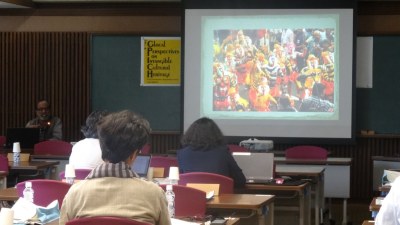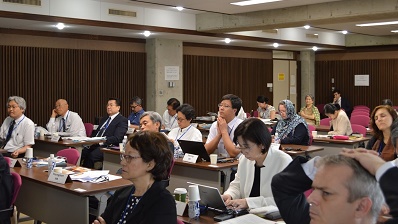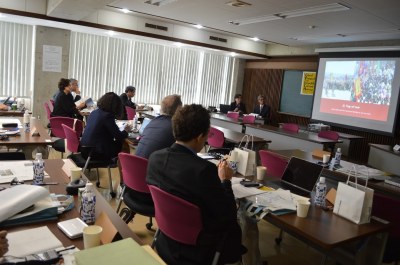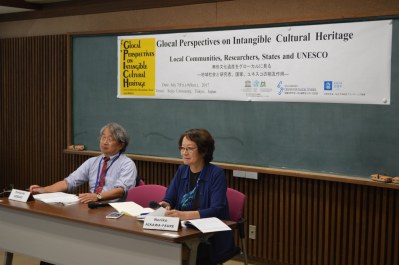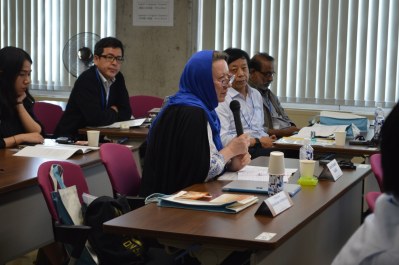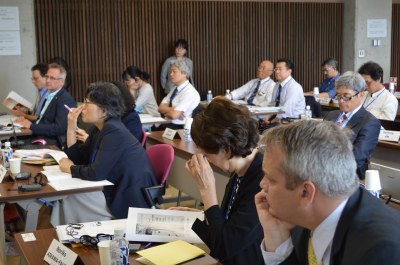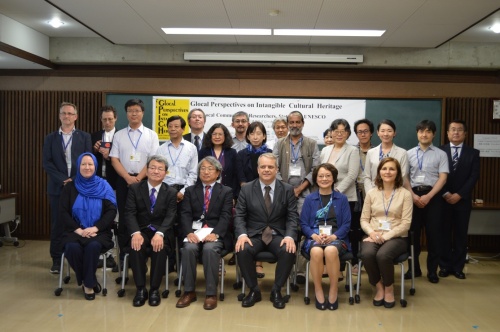

NEWS
2017.08.04
<Synopsis>
From Friday, July 7, to Saturday, July 9, 2017, Seijo University’s Center for Glocal Studies co-hosted the international symposium, “Glocal Perspectives on Intangible Cultural Heritage: Local Communities, Researchers, States, and UNESCO,” as part of the university’s project to “establish and promote a world-leading glocal-studies center that contributes toward a sustainable and inclusive society” (a MEXT-supported Research Branding Program for Private Universities). The event was co-hosted by the International Research Centre for Intangible Cultural Heritage in the Asia-Pacific Region, as well as the Agency for Cultural Affairs. The first two days of the event (keynote address, presentations, and discussion) took place at Seijo University’s Main Administrative Office, Building 3F, Main Meeting Room. The third day involved an excursion to the Atsugi Southern Community Hall and Community Civic Center, an Important Cultural Property of Japan.
<Report>
The conference was attended by over 90 individuals from 13 countries. The attendees included Koichiro Matsuura (former Director-General of UNESCO), Tim Curtis (Section Chief of the UNESCO Headquarters in Paris), Michael Dylan Foster (University of California, Davis), Hanhee Hahm (Chonbuk National University, Republic of Korea), Thi Hien Nguyen (Vietnam National Institute of Culture and Art Studies), Janet Blake (University of Shahid Beheshti, Iran), and many other researchers, local/national government officials, and non-governmental organization (NGO) members involved in the safeguarding of Intangible Cultural Heritage (ICH) in the Asia-Pacific Region.
On the first day of the gathering (Friday, July 7), opening addresses were given by Junichi Tobe (President of Seijo University), Tomiyuki Uesugi (Director of the Center for Glocal Studies, Seijo University), and Sho Iwamoto (International Research Centre for Intangible Cultural Heritage in the Asia-Pacific Region). These addresses were followed by two keynote speeches and three sessions.
Koichiro Matsuura (former Director-General of UNESCO) delivered the first keynote speech, titled “The UNESCO Convention for the Safeguarding of the Intangible Cultural Heritage and Its Glocal Perspectives.” Matsuura outlined the background to the ratification of the Convention, which took place during his tenure as Director-General. He also emphasized the value of the Convention from global and local (i.e., glocal) perspectives.
Lourdes Arizpe (National Autonomous University of Mexico) delivered the second keynote speech by video message, on the theme, “Toward Incorporating Local People’s Creativity in a New World Culture.” Arizpe argued that the culture exemplified in ICH has become increasingly important and valuable amid today’s chaotic world. She also discussed the present-day issue of how nation states and the international community can ensure that the creativity and diversity of local communities are included and reflected in Intangible Cultural Heritage.
Following the keynote addresses, three afternoon sessions were held.
The theme of Session 1 was, “How do local communities, local officials, researchers, and government officials collaborate for the implementation of the UNESCO’s ICH convention (inventory making, safeguarding, nomination, and inscription)?” The session consisted of presentations delivered by speakers from South Korea (Hanhee Hahm and Younghoon Ha), Vietnam (Thi Hien Nguyen), and Japan (Minoru Kobayashi).
The theme of Session 2 was, “What has been the transformative impact of the Convention; notably, how have communities assessed its impact?” The session consisted of presentations delivered by speakers from India (Shubha Choudhuri, delivered by video), China (Deming An), and Japan (Hiroyuki Shimizu). The theme of Session 3 was, “What is the role of researchers as ‘cultural brokers’ in assessing the impact of the implementation of the Convention?” The session consisted of presentations delivered by speakers from Thailand (Alexandra Denes) and Japan (Satoru Hyoki and Seiichi Nakajima).
The second day of the event (Saturday, July 8) consisted of two sessions (Sessions 4 and 5) and a general discussion. The theme of Session 4 was, “What are the possible feedback mechanisms for local communities to communicate to UNESCO the Convention’s impact on them?” The session consisted of presentations delivered by speakers from Iran (Janet Blake), Kyrgyzstan (Cholpona Usubalieva-Gryshchuk, delivered by video), India (Vayalkara Jayarajan), and China (Yiqi Ha).
The theme of Session 5, which was organized by the IRCI, was titled “New initiative to encourage the IRCI’s ICH researchers’ network.” The session concerned the efforts of the International Research Centre for Intangible Cultural Heritage in the Asia-Pacific Region to build a researcher network that can more effectively facilitate the gathering of basic data on safeguarding ICH in the Asia-Pacific Region. The session consisted of presentations delivered by speakers from Japan (Shigeaki Kodama), Thailand (Alexandra Denes), South Korea (Hanhee Hahm), and Vietnam (Thi Hien Nguyen).
In the ensuing general discussion, the following issues were discussed.
The first issue concerned the definition and scope of Communities, Groups, and Individuals (CGIs)—the parties who are involved in safeguarding ICH and who are most affected by the UNESCO Convention for the Safeguarding of the Intangible Cultural Heritage. The attendees debated the question of who the CGIs are, how broadly CGIs are defined, and in what sense people are CGIs. Attendees concluded that there should be no hard-and-fast definition; instead, CGI should be defined flexibly, taking into account the circumstances and contexts of the heritage concerned.
The second issue concerned how heritage itself is affected by its inclusion on UNESCO’s Representative List of the Intangible Cultural Heritage of Humanity. Of particular note, attendees questioned whether UNESCO listings really fulfill their original purpose, to safeguard cultural diversity. It was suggested that the listings might, conversely, encourage more cultural homogenization.
The third issue concerned the political significance and impact of having a heritage included on UNESCO’s Representative List of the Intangible Cultural Heritage of Humanity. Listed Intangible Cultural Heritage provides cultural linchpins for the CGIs who safeguard and preserve them; at the same time, ICH has social, economic, and even political significance for CGIs and local and national governments. In relation to this point, attendees argued that listings entail both advantages and disadvantages, and that the important thing is to strike the right balance between them.
The fourth point concerned the benefits and problems of having governments take the lead in efforts to safeguard ICH. The fifth point concerned the role that NGOs, non-profit organizations (NPOs), and other non-governmental volunteer organizations play in safeguarding ICH. It was argued that these organizations face hurdles in communicating their feedback to UNESCO. Various other issues were raised in this animated discussion, and the symposium ended on a high note.
This symposium built upon the findings of two preceding symposia. The first of these symposia was, “Glocal Perspectives on Intangible Cultural Heritage: Local Communities, Researchers, States, and UNESCO” (held on February 18, 2017) and the second was, “The Roles of Communities, Groups, and Individuals (CGIs) and Cultural Coordinators in UNESCO World Heritage” (held on May 13, 2017). The proceedings of the former have been published in “Glocal Perspectives on Intangible Cultural Heritage: Local Communities, Researchers, States, and UNESCO, With a Special Focus on Global and National Perspectives” (Center for Glocal Studies, 2017).
In these two symposia, attendees argued that in examining the Convention for the Safeguarding of the Intangible Cultural Heritage, and initiatives related to the safeguarding of ICH, more needs to be done to listen to the voices of CGIs regarding these matters, including the voices of the individuals and communities who are most affected by such, and the individuals who sometimes become CGIs by virtue of being involved in the administration of safeguarding efforts. Hence, it was decided that the present symposium should at least invite CGIs as speakers in an attempt to bring their views into focus. The symposium was also an attempt to engage CGIs in a discussion on the impacts of the Convention for the Safeguarding of the Intangible Cultural Heritage and to find a way to relay CGI feedback to UNESCO.
That said, even this symposium did not go sufficiently far in engaging CGIs and relaying their feedback to UNESCO, with regard to the Convention for the Safeguarding of the Intangible Cultural Heritage. However, as the research institute that helped organize the symposium, we believe that the symposium has provided an impetus to facilitate further CGI engagement in UNESCO’s policymaking, and further debate into CGI feedback mechanisms.
The Center for Glocal Studies is working to publish the symposium proceedings as soon as possible.
